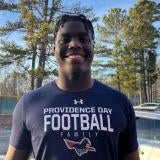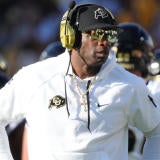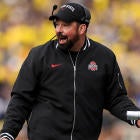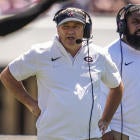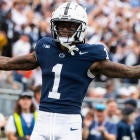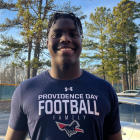The ACC struck out the last time it seriously made noise to compete in football with the SEC. Knowing football money dictates how economics work in college sports, ACC commissioner John Swofford expanded in 2004-05 to add Miami, Virginia Tech and Boston College.
This was a period when the ACC split 36 games against SEC, which was saddled with several NCAA probations, from 1999 to 2003. Arguments got made by coaches and in the media that the ACC had surpassed the SEC and better positioned than its neighbor for the future due to expansion. Florida State's Bobby Bowden even bragged in 2004 that, by adding Miami, "The state of Florida is going to learn about the ACC" and "the stepbrother is down in Gainesville."
Yeah, that didn't happen. The SEC won seven straight national titles with Alabama, Florida, LSU and Auburn. The ACC, which has won only seven football national titles in its history, went 14 years without winning one during its longest drought since 1953-81.
Fast forward to today. The ACC -- not the Big Ten, as I wrote earlier this year -- turned out to be the best conference in 2016 thanks largely to coaches and quarterbacks. The question now: Is the ACC better positioned to sustain success than the last time it surpassed the SEC in football?
"Now we just need to continue that upward trajectory of staying there, and that's hard to do," Swofford said. "But to stay there, you have to get there first."
What changed is Clemson and Florida State became elite at the same time. Dabo Swinney and Jimbo Fisher, two former SEC assistants, brought an SEC mentality to the ACC that upped the ante. Fisher said no to LSU in consecutive years, and Swinney doesn't face his potential Alabama question yet.
At the moment, the SEC is Alabama and Everyone Else. This season was the first in SEC history in which only one team (Alabama) finished with fewer than four losses.
For the first time since 2002, only one SEC team finished in the final top 10 of the AP Top 25. The SEC had five final top-10 teams combined from 2014-16, down from 13 in the previous three seasons.
"We've had some coaching transition and the game of football can be cyclical at times," SEC commissioner Greg Sankey said. "We've been at the peak a long time. We'll see it continue, I hope. I don't think at all there's some destination we've reached. We'll still continue to be the highest level of football because that's the expectation."
Clemson-Florida State has supplanted Alabama-LSU as the best annual game in college football. It's a game you feel fairly confident will possess national championship implications every year.
With the bar raised, ACC schools such as Miami, Virginia Tech, Louisville, Pittsburgh and even Virginia and Syracuse made promising coaching hires in recent years. Eleven ACC teams finished with a winning record in 2016, including postseason wins over Alabama, Michigan and Ohio State.
The ACC had a 10-4 record for the year vs. the SEC -- topped by Clemson over Alabama in the College Football Playoff National Championship -- and won those games by an average of 11.3 points. For the first time since 2002-03, the ACC has a winning record over the SEC twice during a three-year period.
Since 2014, the ACC is 19-13 vs. the SEC. From 2004-13, starting when Miami joined the conference, the ACC was 30-53 vs. the SEC.
"I think all you media folks need to change your stories," Swinney said. "It sounds good. I've been in this league a long time, and this league has never gotten the respect that it deserves. But I said about five years ago or something, just keep your mouth shut and go play. If we want to change the story, then we've got to change it from the inside out. ... You've got to win those games. I told my AD that. I told Terry Don Phillips that."
| ACC | SEC | 2016-17 Score | Event |
| Clemson | Auburn | W 19-13 | Chick-fil-A Kickoff Game |
| North Carolina | Georgia | L 24-33 | |
| Florida State | Ole Miss | W 45-34 | |
| Virginia Tech | Tennessee | L 24-45 | |
| Georgia Tech | Vanderbilt | W 38-7 | |
| Florida State | Florida | W 31-13 | |
| Georgia Tech | Georgia | W 28-27 | |
| Louisville | Kentucky | L 38-41 | |
| Clemson | South Carolina | W 56-7 | |
| NC State | Vanderbilt | W 41-17 | Independence Bowl |
| Virginia Tech | Arkansas | W 35-24 | Belk Bowl |
| Georgia Tech | Kentucky | W 33-18 | TaxSlayer Bowl |
| Louisville | LSU | L 9-29 | Citrus Bowl |
| Clemson | Alabama | W 35-31 | National Championship |
The rise of Clemson and Florida State
In a way, any story about the ACC's revival really should start with Terry Don Phillips. He's not a household name, but he should be given how far he stuck his neck out for Swinney as Clemson's athletic director.
Unlike the SEC, which possesses deeper history, greater financial resources and more rabid fan bases, the ACC can't be great unless its best teams flirt with greatness. If Miami ever returns to greatness, that would help. Virginia Tech certainly has some history. Louisville made some noise lately, though fell off late in 2016.
But Clemson and Florida State -- those schools must set the standard for the ACC. They're as close to SEC schools as the ACC has, and in 2010, they were nowhere near that level. In Fisher's first year as Florida State's coach, the Seminoles went 10-4. ACC champion Virginia Tech finished as the league's highest-ranked team (No. 16) following a 40-12 loss to Stanford at the Orange Bowl.
Meanwhile, Clemson went 6-7 under Swinney, who was promoted to head coach in 2008 with no coordinating experience. Phillips had considered coaches such as Lane Kiffin, Gary Patterson, Jim Grobe, Brent Venables, Brady Hoke and Troy Calhoun, but he trusted his gut with Swinney. After Clemson got routed by South Carolina in 2010, even Swinney thought Phillips planned to fire him.
Around that time, Phillips and the athletic department were undergoing a thorough vetting by then-Clemson president Jim Barker. Some media outlets called for Phillips to be fired given the questions about Swinney's viability. Some fans and boosters wanted him gone, too.
"To be honest with you, after a few emails, I quit reading email," Phillips said. "I didn't need to read them. You get some things that are hateful. I would say, 'OK, I'm not gonna learn anything from that and reading it won't do any good.' Clemson is no different than any other great university that loves football and they want to be as good as anybody in the country. When it doesn't work out, people are disappointed and disgruntled. That's why changes are usually made when that occurs."
Phillips didn't make the change, even though he could have justified it given Swinney's lack of experience as a head coach or coordinator. Phillips had spent eight years watching Swinney as Clemson's wide receiver coach, interim coach and permanent coach.
Phillips remembered how players other than wide receivers often migrated to Swinney's office when he was a position coach. Phillips, an old defensive player, used to find himself watching Swinney at practice because of how hard he coached receivers for their technique to be right. Phillips said he was amazed Swinney could "draw a line in the land" and be friendly to the players off the field while pushing them so hard on it.
Phillips remembered Swinney's 2006 signing of five-star running back C.J. Spiller, who opened the door for Clemson to attract more high-profile recruits. He remembered Clemson's summer camps exploding with more recruits when Swinney took over. He remembered Swinney's work ethic, optimism and energy, and the respect other campus leaders had for him.
So Phillips backed Swinney, and Barker backed Phillips to Clemson's board of trustees. Two years later, Phillips announced his retirement.
"I've always used the Frank Beamer comparison," Phillips said. "Because his first few years [at Virginia Tech] it was ugly before it turned and stayed turned. These intangibles you see with Dabo, you really can't communicate that to the public because they're not gonna understand that. They're gonna look at that scoreboard and see if you won or lost, and if you lost, they're not happy. That's what occurred early in that period. Even right now, it's hard to totally explain why I would make that decision. I made a decision, and it's subjective, simply because you can't quantify what he was doing."
In 2011, Clemson and Florida State finished ranked 22nd and 23rd, respectively. They were quickly building. Since 2012, the Tigers and Seminoles have both finished in the top 15 every year. Florida State or Clemson has played in three of the past four national championship games, winning two over the SEC and nearly capturing the other one.
Several years ago, Clemson and Florida State were the subject of Big 12 expansion rumors. Now they're the linchpins of the ACC, which added a football scheduling relationship with Notre Dame, lost Maryland to the Big Ten, and added Syracuse, Louisville and Pittsburgh to correct its off-track basketball course due to the 2004-05 expansion driven by football.
"I think we've been able to [succeed in football] while retaining our place in basketball circles, too," said Swofford, a former North Carolina football player. "It hasn't come at the expense of that. Obviously, when you're a guy that's spent your whole career in this league as I have [and] played football in this league, this sport is special to me."

ACC gains an edge at quarterback
While the SEC continues to go through a coaching transition -- this past season was the least-experienced group of SEC head coaches in 52 years -- the ACC closed the gap by gaining an edge at quarterback. Elite quarterbacks from the ACC/SEC footprint started swinging to the ACC.
Jameis Winston started the trend by leaving Birmingham, Alabama, for Florida State instead of signing with Alabama or Auburn.
Deshaun Watson was raised in Gainesville, Georgia, but he became a Clemson Tiger, not a Georgia Bulldog.
Lamar Jackson, who was under-recruited out of Boynton Beach, Florida, chose Louisville despite a late push by Florida.
Deondre Francois, who is from Orlando, went to Florida State after Florida swung and missed on him, too.
No one disputes the overall talent in the SEC, especially on defense. The SEC has led college football in NFL Draft picks for 10 consecutive years. But all of the speed, strength and athleticism can only take a team so far without a quality quarterback. Alabama's Jalen Hurts showed great poise and may be terrific in the future, but he got exposed as a freshman in the College Football Playoff given his passing limitations.
From 2012-16, SEC teams signed 39 four- or five-star quarterbacks, according to 247Sports. So far, only one of those recruits turned into a very important player who finished his career at the same school: Tennessee's Joshua Dobbs. Major SEC recruits like David Cornwell, Kyler Murray, Kyle Allen, Kenny Hill, Will Grier, Maty Mauk, Hayden Rettig and Zeke Pike have come and gone.
Over the same period, ACC teams signed 21 four- or five-star quarterbacks. As of now, three of them have looked elite and stayed at their school the entire time: Winston, Watson and Miami's Brad Kaaya.
The hit-rate scoreboard on these quarterback recruits: 14 percent for the ACC, 3 percent for the SEC.
The SEC had one passer in 2016 ranked among the top 25 quarterback rating (Dobbs), according to CFBStats.com. The ACC had six (Pittsburgh's Nathan Peterman, North Carolina's Mitch Trubisky, Virginia Tech's Jerod Evans, Watson, Kaaya and Jackson).
However, only Jackson will return from that group in 2017. The SEC will bank on the possible bright futures of Hurts, Ole Miss' Shea Patterson, Georgia's Jacob Eason, Florida's Feleipe Franks, Tennessee's Jarrett Guarantano and South Carolina's Jake Bentley. Half of the top-14 rated quarterback recruits in 2017 are going to the ACC or SEC, including No. 2 Hunter Johnson to Clemson and No. 3 Tua Tagovailoa to Alabama.
Meanwhile, many SEC schools continue to invest higher amounts of money into head coaches, meaning the pressure is often raised for them to succeed earlier yet sometimes tying schools' hands to fire them. In recent years, the SEC became this odd whack-a-mole game where almost every coach not named Nick Saban appears on "hot seat" lists every so often.
How strange did this year get for the SEC? The offensive coordinators at Alabama, Auburn and Tennessee have moved on to jobs at Florida Atlantic (as head coach), Connecticut and Indiana, respectively. They left for different reasons, but those aren't typical moves.
One former SEC coach, who also worked in the ACC, said he sees more ACC coaches with greater authority over their program than in the SEC. By that, the coach means teams have so many more staff members now who influence players -- player personnel, analysts, strength coaches, nutritionists, psychologists, etc. -- that it's changed what the authority of the SEC head coach once meant in a program.
"I think players today have to live in a domain where they get a consistent message, and there's only one place in the SEC where I see a player talk like his head coach [Alabama]," said the coach, who asked to remain anonymous. "There is complete sovereignty with everything that touches a player at Alabama. Dabo has sovereignty at Clemson.
"I think a lot of money has been put in the hands of SEC ADs to put their football coaches in a lot less control than what Nick Saban's got. Not a lot of executives really understand what's going on. On every given Saturday, there's only about a seven-point swing in a game. How fine does the edge have to be honed to be a dominant football team? Right now, the SEC is extremely diluted in mediocrity."
Sankey, the SEC's commissioner, acknowledged the downward trend. He said he still believes 2016 was a competitive year for the SEC, which went 4-10 vs. the ACC but 7-4 against the Big Ten, Big 12 and Pac-12.
"Alabama has obviously set itself apart," Sankey said. "But at Ole Miss, they were down 24-3. At home against Texas A&M, they were down in the third quarter. It was a 10-0 game in Baton Rouge. So it's still a competitive league. ... No excuses. We want to have great success, but I think it was still a great season."
What changed for the SEC?
"The easy observation is everybody wants what we achieved," Sankey said.
The SEC has plucked a few assistants from the ACC this offseason. Mississippi State hired away Louisville defensive coordinator Todd Grantham. LSU got Pittsburgh offensive coordinator Matt Canada, who spent the past four years at two ACC jobs.
With a more rabid fan base, the SEC still has more money than the ACC, which plans to launch a TV network with ESPN by 2019. In 2006-07, the ACC had a higher average payout to its schools ($11.5 million) than the SEC did ($11 million). By 2014-15, the most recent available year for tax records, the SEC distributed about $32.7 million to schools and the ACC paid out roughly $27 million. Money helps, but it only goes so far.
"You don't want to play a team from this conference," Swinney said of the ACC, which went 16-6 vs. the SEC and Big Ten in 2016. "You just don't. I don't care -- name one. That's why we're ready. That's why we're ready to go play Oklahoma two years in a row. That's why we're ready to go play Ohio State two out of the last four years. We're ready because of what we see week in and week out in this conference."
The SEC won't fall off the face of the Earth, but the axis no longer solely revolves around it. The ACC won't always be this good in football, but the blueprint is now available for more sustained success than the last extended period when the conference could boast.
Hire better coaches. Pick the right quarterbacks. Create a larger league for TV money. Win more high-profile games. Commit more to football, the sport that dominates the economic structure of college sports, and still rack up NCAA Tournament success in basketball.
"I think the narrative of ACC football has changed over the last five years," Swofford said, "and it needed to."






